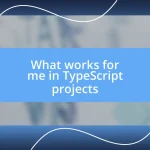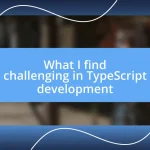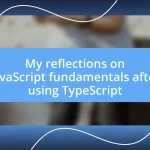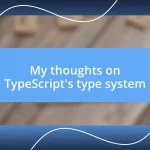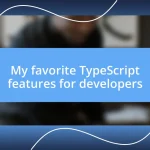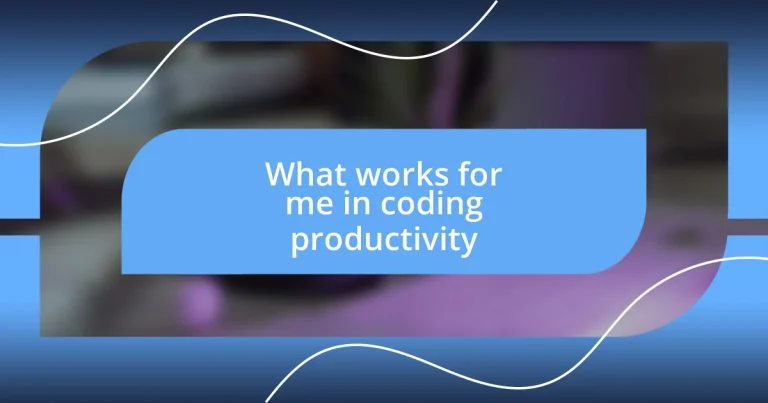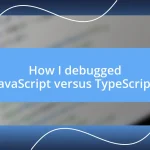Key takeaways:
- Implementing structured techniques like the Pomodoro Technique and time-blocking can significantly enhance focus and productivity in coding sessions.
- Creating a comfortable and organized workspace, along with minimizing digital distractions, greatly impacts coding flow and energy levels.
- Utilizing effective coding tools and maintaining a consistent routine, including celebrating small wins, helps reinforce productive habits and fosters a sense of achievement.
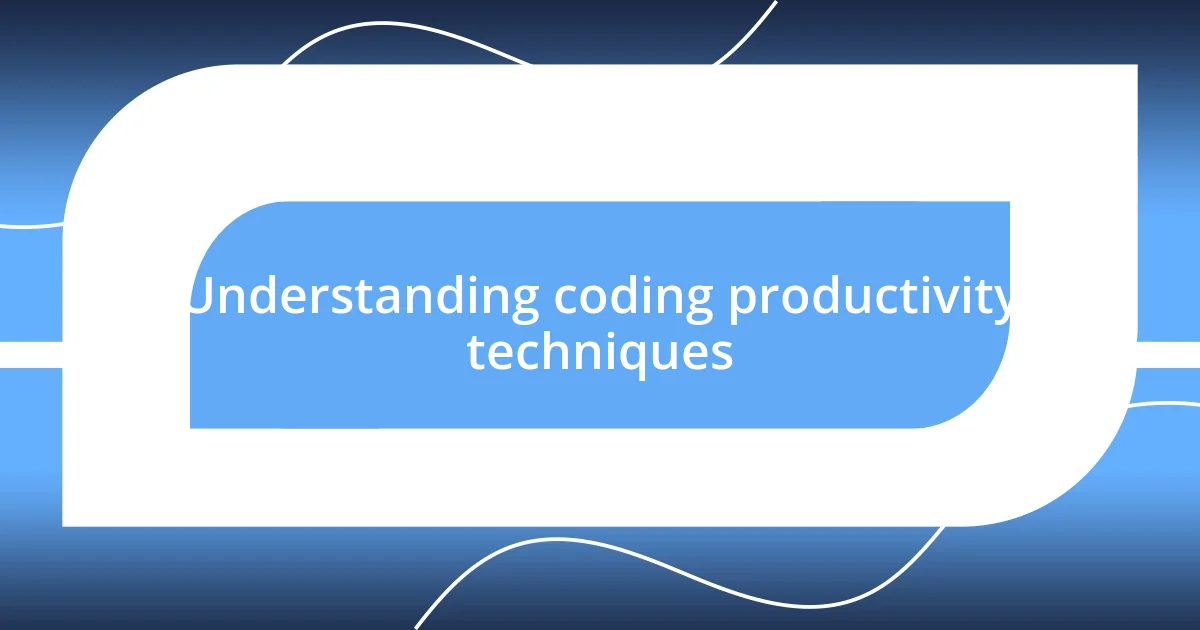
Understanding coding productivity techniques
When I first started coding, I struggled with distractions. I quickly realized that setting clear, achievable goals for each session transformed my productivity. Have you ever noticed how much easier it is to stay focused when you know exactly what you want to accomplish?
One technique that has really worked for me is the Pomodoro Technique. This method involves working in focused bursts of 25 minutes, followed by a 5-minute break. It may sound simple, but I often find that those brief moments to step away from my screen can reignite my creativity. Have you ever taken a walk during a break, only to return with fresh ideas?
Additionally, I’ve found that organizing my workspace can significantly impact my coding flow. I remember cleaning my desk one day and instantly feeling more motivated to tackle my projects. It’s amazing how the environment affects your mindset, isn’t it? Keeping my tools and resources within reach helps me maintain that momentum.
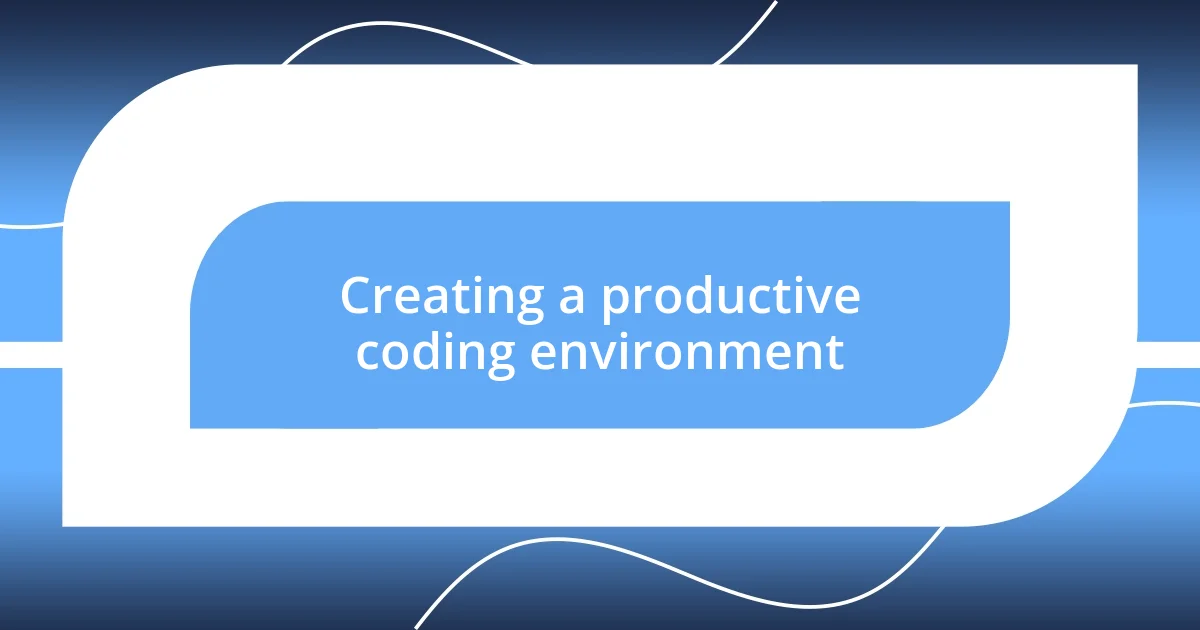
Creating a productive coding environment
When I reflect on my coding environment, I realize the importance of comfort. I invested time in finding an ergonomic chair and desk setup that supports long hours of coding without causing strain. It’s remarkable how a comfortable environment can positively impact focus and energy levels. Have you ever felt your productivity dip when you’re not physically comfortable?
Moreover, I consider lighting essential in creating an optimal coding environment. Natural light boosts my mood and keeps me alert. I once worked in a dim room and noticed how quickly my energy waned. Adding a desk lamp with warm light made a huge difference, lifting my spirits and helping me stay engaged for longer periods.
Lastly, minimizing digital distractions has become a pivotal part of my coding process. I use apps that block social media during work hours, which has significantly improved my focus. There’s something refreshing about eliminating those notifications that tug at my attention. Have you ever tried removing distractions? It’s liberating and truly boosts productivity.
| Aspect | Personal Experience |
|---|---|
| Comfort | Invested in ergonomic furniture; increased my focus and energy. |
| Lighting | Natural light boosted my mood; switching to warm desk lamps made a notable difference. |
| Digital Distractions | Using blocking apps allowed me to focus; it’s liberating to eliminate notifications. |
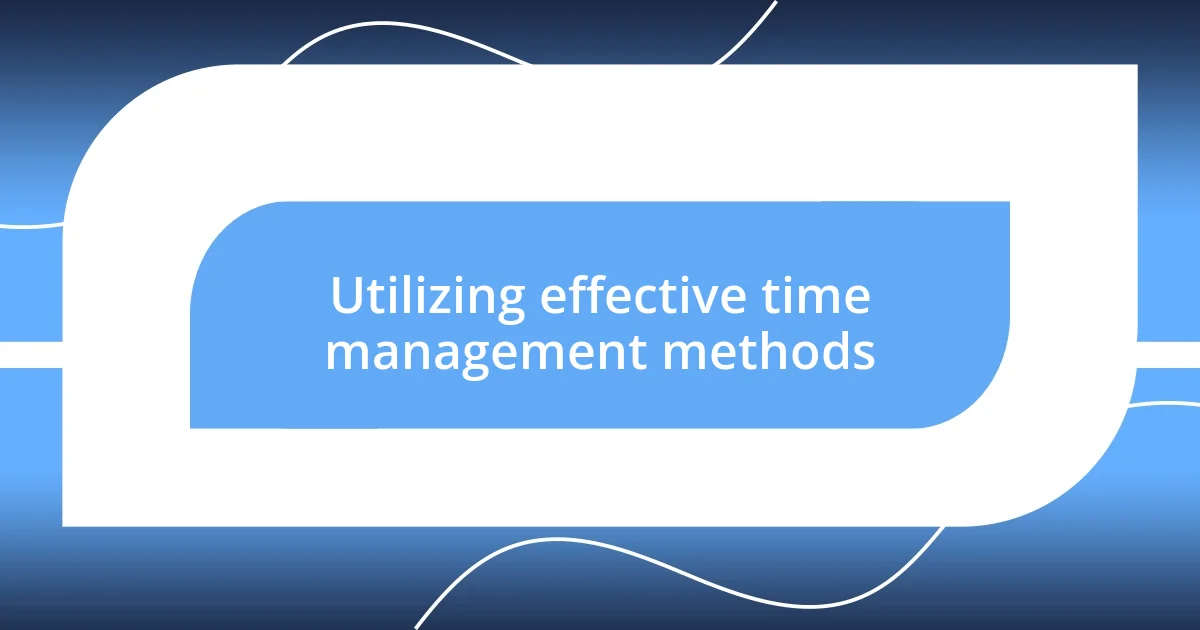
Utilizing effective time management methods
Utilizing effective time management methods has tremendously shaped my coding journey. One method I embraced is the time-blocking technique, where I allocate specific blocks of time to different coding tasks. This practice not only helps me concentrate but also removes the ambiguity of my daily agenda. I remember one hectic week when I set aside two hours every morning solely for coding; it felt incredibly rewarding to see the progress I made. Have you ever noticed how setting boundaries around your time can transform your workflow?
I also make it a point to prioritize tasks using the Eisenhower Matrix, which distinguishes between what’s urgent and what’s important. This approach allows me to focus on high-impact tasks first. After adopting this method, I felt a sense of relief. No longer was I lost in a sea of tasks; I was steering my focus towards what truly mattered. Here are a few methods that I find particularly effective:
- Time Blocking: Schedule specific blocks for dedicated tasks to enhance focus.
- Eisenhower Matrix: Sort tasks by urgency and importance to prioritize effectively.
- Daily Reviews: Reflect on what worked at the end of the day to adjust for tomorrow.
I can’t help but think back to when I first used these strategies. It was like flipping a switch. My productivity skyrocketed, and I felt more accomplished. What are some time management methods you’ve tried that made a difference for you?
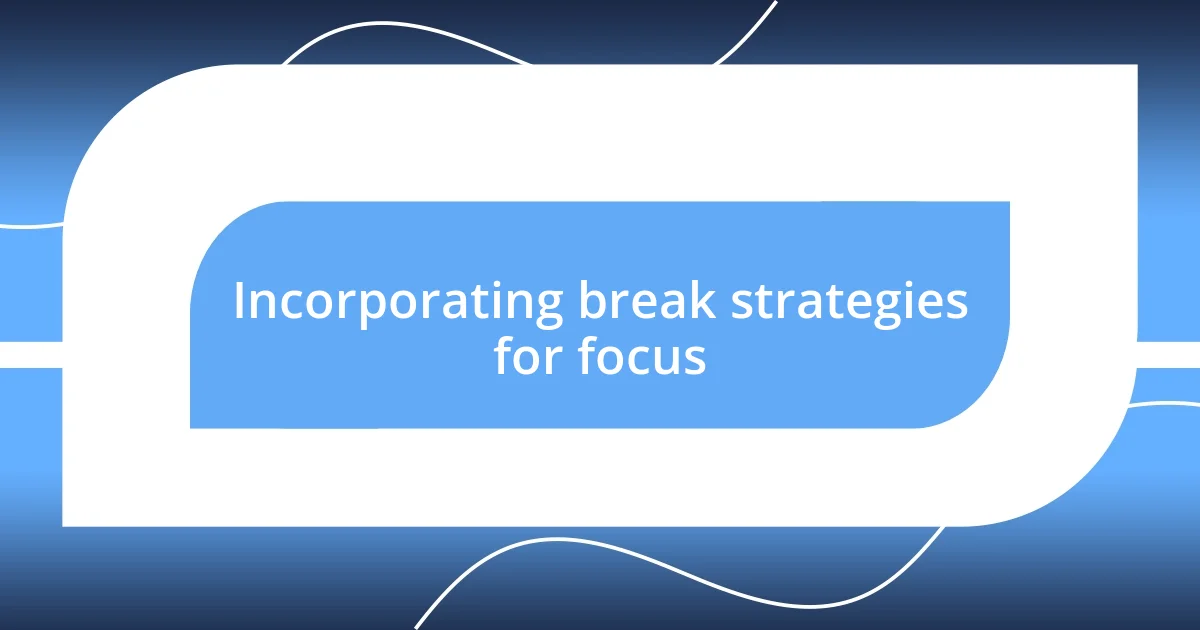
Incorporating break strategies for focus
Incorporating break strategies has been a game-changer in my coding productivity. I find that stepping away from my screen, even for a brief five-minute break, allows my mind to reset. It’s fascinating how a short walk or a stretch can re-energize me. Have you ever felt the clarity that comes after a break? I certainly have, and it’s invigorating.
One strategy I love is the Pomodoro Technique, where I work for 25 minutes and then take a five-minute break. During those short breaks, I go for a quick walk or sip some water. This routine not only keeps me focused but also makes those focused bursts feel like a rewarding challenge. I remember the first time I tried this method; I felt more aware of how I structured my time, and the rhythm became addictive. What routines work best for you?
Finally, I make it a point to use longer breaks intentionally—like taking a full half-hour after every two or three productive hours. This is my chance to step away from the coding chair and do something completely different, like reading or catching up with a friend. I can’t emphasize enough how these breaks help clear my thoughts and boost my creativity. Have you noticed how shifting gears can lead to a breakthrough in problem-solving? It’s amazing to me how distance often brings new perspectives.
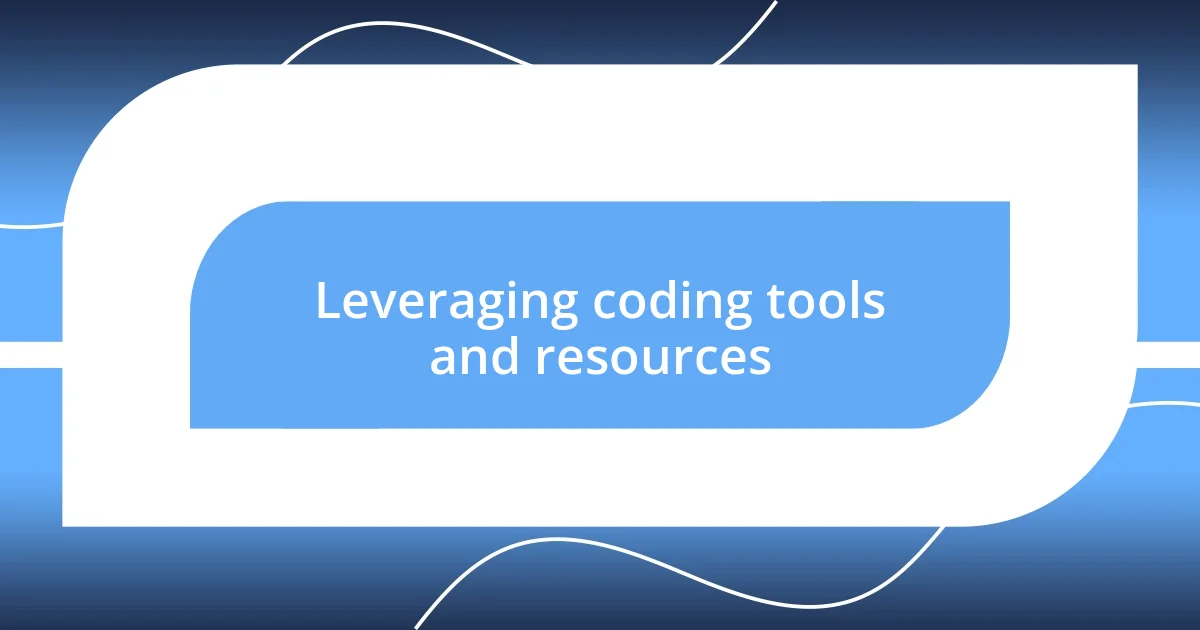
Leveraging coding tools and resources
Utilizing the right coding tools and resources has been pivotal in optimizing my productivity. I can’t stress enough how using an integrated development environment (IDE) has streamlined my workflow. For instance, when I switched to Visual Studio Code, the built-in features like real-time error detection and code suggestions transformed my coding process. Have you ever experienced a tool so intuitive that it felt like an extension of your own thought process? It really does make a difference.
In addition to IDEs, I often rely on version control systems, especially Git. The first time I committed my code changes and realized I could easily revert to previous versions, it was like a safety net had been cast around my work. I mean, who hasn’t faced that moment of panic when something goes wrong? Knowing I could roll back my code gave me the confidence to push boundaries in my projects. How do you keep track of your code changes?
Lastly, I can’t overlook the power of online coding communities and resources. Platforms like Stack Overflow and GitHub have not only solved countless problems for me but also fostered a sense of belonging in the tech world. I recall a particularly tricky bug I wrestled with for hours. After posting a question online, I received a solution within minutes from someone halfway across the globe. It’s a reminder that collaboration and sharing knowledge can spark innovation and learning. Have you connected with others through these platforms? It’s incredibly enriching to share experiences and insights.
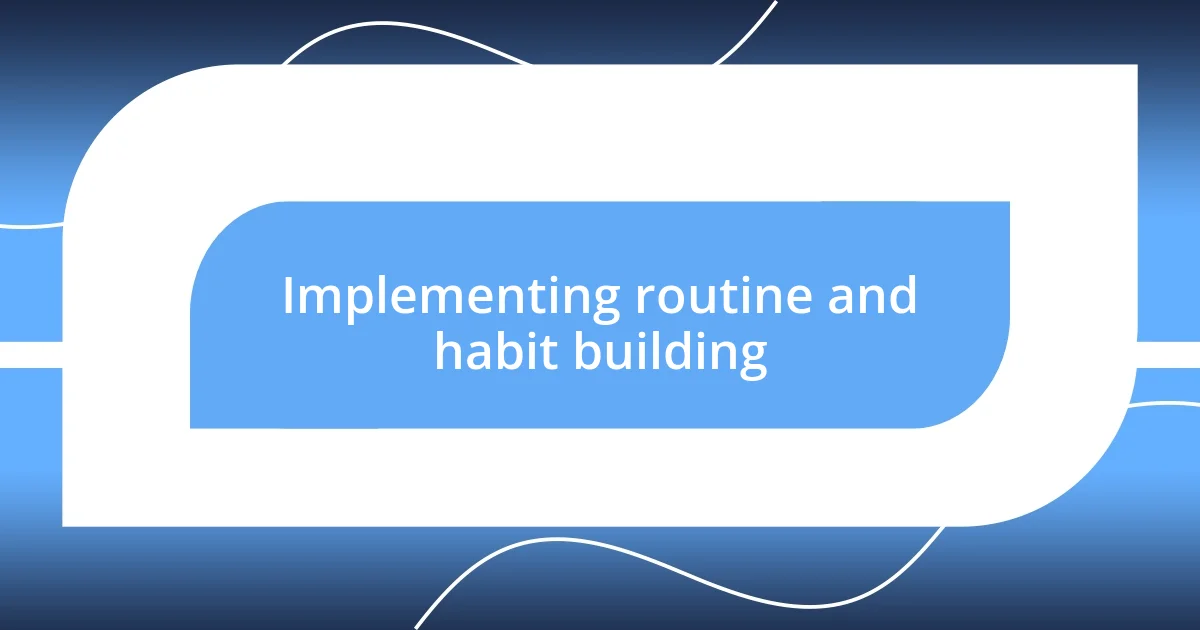
Implementing routine and habit building
Building a routine has been key in shaping my coding productivity. I typically start my day with a set schedule that outlines when I’ll code, take breaks, and even when I’ll dive into learning something new. There’s a comforting predictability in knowing that every day begins with a familiar ritual. Have you ever noticed how starting the day on a structured note can set the tone for everything that follows? For me, it makes all the difference.
Forming habits takes consistency, and I’ve learned that celebrating small wins can reinforce my commitment. For instance, when I complete my coding tasks for the day, I treat myself to my favorite coffee or a mini reward, like watching an episode of a series I love. This reinforces my routine and provides a motivational boost. Did you know that rewarding yourself can actually strengthen those new habits? I’ve found it makes the sometimes monotonous grind much more enjoyable.
Another aspect I swear by is tracking my progress. I keep a simple log that notes what I accomplished each day, which gives me a sense of achievement. Over time, I can look back and see how far I’ve come, and it motivates me to keep pushing forward. Sometimes, I even share these milestones with friends or fellow coders, which adds an extra layer of accountability. How do you keep track of your achievements? It’s empowering to see growth, and it fuels my passion for coding even further.
